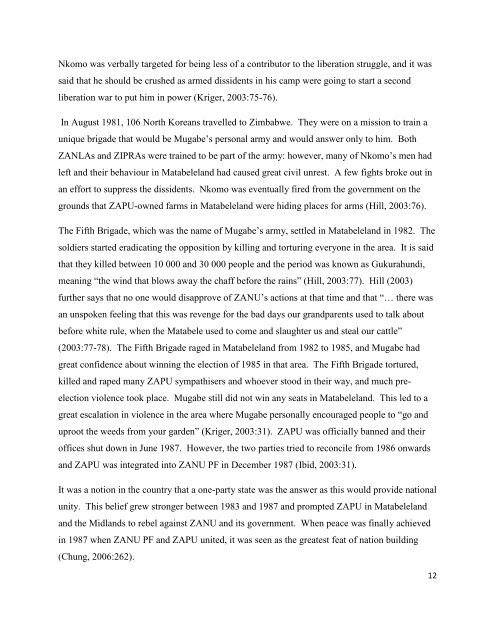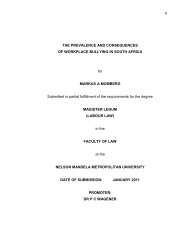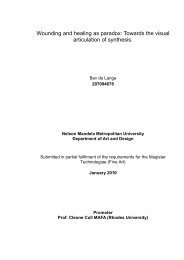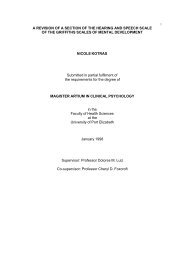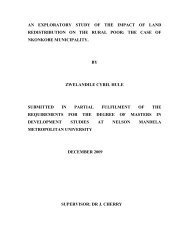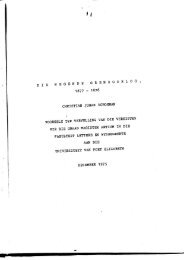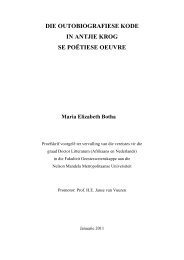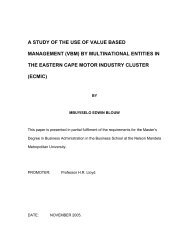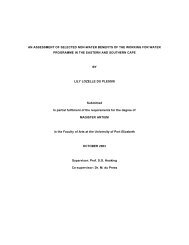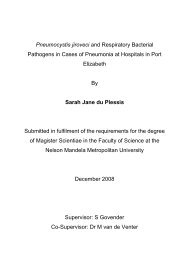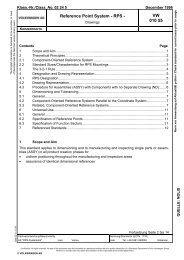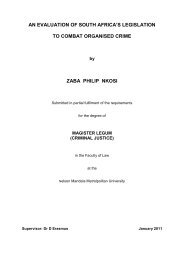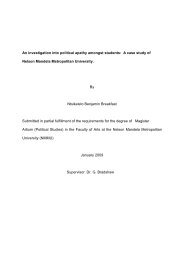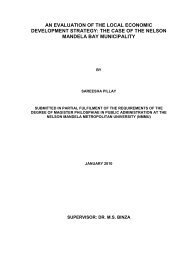Guro Lauvland Bjorknes.pdf - NMMU
Guro Lauvland Bjorknes.pdf - NMMU
Guro Lauvland Bjorknes.pdf - NMMU
You also want an ePaper? Increase the reach of your titles
YUMPU automatically turns print PDFs into web optimized ePapers that Google loves.
Nkomo was verbally targeted for being less of a contributor to the liberation struggle, and it was<br />
said that he should be crushed as armed dissidents in his camp were going to start a second<br />
liberation war to put him in power (Kriger, 2003:75-76).<br />
In August 1981, 106 North Koreans travelled to Zimbabwe. They were on a mission to train a<br />
unique brigade that would be Mugabe‟s personal army and would answer only to him. Both<br />
ZANLAs and ZIPRAs were trained to be part of the army: however, many of Nkomo‟s men had<br />
left and their behaviour in Matabeleland had caused great civil unrest. A few fights broke out in<br />
an effort to suppress the dissidents. Nkomo was eventually fired from the government on the<br />
grounds that ZAPU-owned farms in Matabeleland were hiding places for arms (Hill, 2003:76).<br />
The Fifth Brigade, which was the name of Mugabe‟s army, settled in Matabeleland in 1982. The<br />
soldiers started eradicating the opposition by killing and torturing everyone in the area. It is said<br />
that they killed between 10 000 and 30 000 people and the period was known as Gukurahundi,<br />
meaning “the wind that blows away the chaff before the rains” (Hill, 2003:77). Hill (2003)<br />
further says that no one would disapprove of ZANU‟s actions at that time and that “… there was<br />
an unspoken feeling that this was revenge for the bad days our grandparents used to talk about<br />
before white rule, when the Matabele used to come and slaughter us and steal our cattle”<br />
(2003:77-78). The Fifth Brigade raged in Matabeleland from 1982 to 1985, and Mugabe had<br />
great confidence about winning the election of 1985 in that area. The Fifth Brigade tortured,<br />
killed and raped many ZAPU sympathisers and whoever stood in their way, and much pre-<br />
election violence took place. Mugabe still did not win any seats in Matabeleland. This led to a<br />
great escalation in violence in the area where Mugabe personally encouraged people to “go and<br />
uproot the weeds from your garden” (Kriger, 2003:31). ZAPU was officially banned and their<br />
offices shut down in June 1987. However, the two parties tried to reconcile from 1986 onwards<br />
and ZAPU was integrated into ZANU PF in December 1987 (Ibid, 2003:31).<br />
It was a notion in the country that a one-party state was the answer as this would provide national<br />
unity. This belief grew stronger between 1983 and 1987 and prompted ZAPU in Matabeleland<br />
and the Midlands to rebel against ZANU and its government. When peace was finally achieved<br />
in 1987 when ZANU PF and ZAPU united, it was seen as the greatest feat of nation building<br />
(Chung, 2006:262).<br />
12


